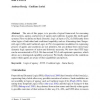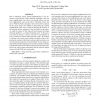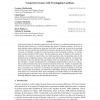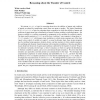149
click to vote
JOLLI
2010
14 years 8 months ago
2010
The aim of this paper, is to provide a logical framework for reasoning about actions, agency, and powers of agents and coalitions in game-like multi-agent systems. First we define ...
148
click to vote
EJWCN
2010
14 years 9 months ago
2010
We formulate the problem of distributed throughput-efficient sensing in cognitive radio (CR) networks as a dynamic coalition formation game based on a Markovian model. The propose...
125
click to vote
CORR
2010
Springer
14 years 9 months ago
2010
Springer
An important task in the analysis of multiagent systems is to understand how groups of selfish players can form coalitions, i.e., work together in teams. In this paper, we study t...
126
click to vote
AAMAS
2011
Springer
14 years 9 months ago
2011
Springer
We consider a problem domain where coalitions of agents are formed in order to execute tasks. Each task is assigned at most one coalition of agents, and the coalition can be reorg...
123
click to vote
ICIP
2010
IEEE
15 years 1 days ago
2010
IEEE
How to adaptively choose optimal neighborhoods is very important to pixel-domain image denoising algorithms since too many neighborhoods may cause over-smooth artifacts and too fe...
133
click to vote
GLOBECOM
2010
IEEE
15 years 1 days ago
2010
IEEE
In current peer-to-peer file sharing networks, a large number of peers with heterogeneous connections simultaneously seek to download resources, e.g., files or file fragments, from...
112
click to vote
LATINCRYPT
2010
15 years 15 days ago
2010
Abstract. In this paper we extend the notion of hierarchical identitybased encryption with wildcards (WIBE) from the domain of a single Trusted Authority (TA) to a setting with mul...
126
click to vote
JAIR
2010
15 years 15 days ago
2010
In the usual models of cooperative game theory, the outcome of a coalition formation process is either the grand coalition or a coalition structure that consists of disjoint coali...
137
click to vote
JAIR
2010
15 years 15 days ago
2010
We present DCL-PC: a logic for reasoning about how the abilities of agents and coalitions of agents are altered by transferring control from one agent to another. The logical foun...
141
Voted
AI
1998
Springer
15 years 1 months ago
1998
Springer
Task execution in multi-agent environments may require cooperation among agents. Given a set of agents and a set of tasks which they have to satisfy, we consider situations where ...




